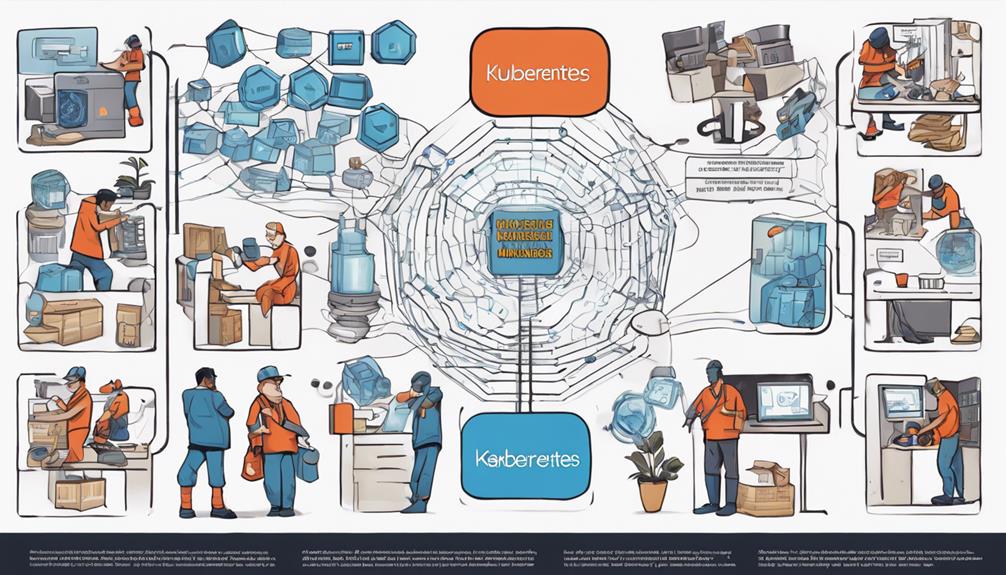Discover the latest innovations in Kubernetes with version 1.30. Enjoy improved resource management, networking capabilities, and strengthened security through timely patches for seamless performance. Curious about the significant enhancements V1.30 brings? Then keep exploring for more valuable insights on this cutting-edge release.
Key Takeaways
- Kubernetes 1.31.0 is the newest version after 1.30.
- Enhanced resource management capabilities in the latest version.
- Improved networking, extensibility, and upgrade processes.
- Focus on security enhancements and bug fixes in patch updates.
- Active support for Kubernetes 1.30 until June 28, 2025.
Release History

Plunging into the release history of Kubernetes, the most recent version is 1.30, which was launched on April 17, 2024. Following Kubernetes' 15-week release cycle, this version brought new features and enhancements to the platform.
Active support for Kubernetes 1.30 is set to continue until June 28, 2025, ensuring users have ample time to benefit from its capabilities.
Prior to Kubernetes 1.30, the version 1.29 was in circulation, with the latest patch version being 1.29.6. This exemplifies Kubernetes' commitment to regular updates and bug fixes, ensuring a stable and secure environment for users.
The progression from 1.29 to 1.30 signifies the ongoing evolution of Kubernetes, with each release building upon the foundation laid by its predecessors.
Understanding the release history of Kubernetes provides insight into the platform's development trajectory and the dedication of the Kubernetes community to deliver cutting-edge solutions to users.
Stay tuned to explore deeper into the enhancements and advancements brought by Kubernetes 1.30.
Latest Kubernetes Version

Discover the newest Kubernetes version, V1.31.0, and uncover the new features and enhancements it brings to the table.
Consider important upgrade considerations to guarantee a smooth shift and peak performance.
Stay informed to make the most out of the latest Kubernetes improvements.
Features in V1.31.0
In Kubernetes v1.31.0, significant enhancements have been implemented to boost scalability, stability, and security. The Kubernetes Authors have incorporated several key features to enhance the overall performance and reliability of the platform:
- Improved resource management capabilities to optimize workload distribution efficiently.
- Enhanced networking capabilities for better communication and connectivity between pods.
- Increased extensibility options to customize and tailor Kubernetes for specific use cases.
- Upgrades in storage, monitoring, and cluster management tools to streamline operations and enhance observability.
Additionally, bug fixes and performance optimizations have been included in this version to address any known issues and enhance the overall user experience. Users are encouraged to explore the detailed changelog to gain a thorough understanding of the updates and improvements introduced in Kubernetes v1.31.0.
Upgrade Considerations
To smoothly upgrade to the latest Kubernetes version, it's important to review the release notes for version 1.30 and plan accordingly. Understanding the changes, bug fixes, and new features introduced in Kubernetes version 1.30 is essential before proceeding with the upgrade.
Keep in mind that Kubernetes follows a support policy of N-2, meaning only the two latest major versions are actively supported. Ensuring that your current version is within the supported range is necessary for a successful upgrade.
When considering upgrade considerations, keep in mind that upgrading Kubernetes involves meticulous planning, thorough testing, and creating backups of important data and configurations. This approach helps mitigate risks and guarantees a smooth progression to the new version.
Additionally, keeping your Kubernetes cluster updated is crucial for enhancing performance, strengthening security measures, and maintaining compatibility with various ecosystem tools. By staying informed and prepared, you can make the upgrade process a seamless experience while enjoying the benefits of the latest Kubernetes advancements.
End of Life Dates

You should take note of the support end dates for Kubernetes 1.30, which are set for 28 June 2025.
The maintenance period will also conclude on the same date, so it's important to plan your upgrade accordingly.
Keep an eye out for patch version updates like the latest 1.30.2 to guarantee your system remains secure and supported.
Support End Dates
Regularly monitoring the support end dates, particularly for the Kubernetes version you're currently using, is vital to guarantee a smooth shift and continued security. The Linux Foundation has registered trademarks to maintain the quality and standards of Kubernetes distributions.
Here are some important points regarding support end dates:
- Kubernetes version 1.30 is set to reach its support end date on June 28, 2025.
- The previous version, Kubernetes 1.29, already reached its end of life on February 28, 2025.
- Older releases like Kubernetes 1.24 had an active support end date of July 28, 2023.
The support policy outlines a 14-month support period for each Kubernetes release, emphasizing the significance of timely upgrades to receive ongoing support and security updates. Keep these dates in mind to stay up to date with Kubernetes support and maintenance requirements.
Maintenance Period Duration
Throughout the lifecycle of Kubernetes versions, the maintenance period duration, specifically the end of life dates, plays a significant role in ensuring continued support and security.
For instance, the most recent Kubernetes version, 1.30, is scheduled to end its maintenance period on June 28, 2025. This signifies that after this date, official support for this version will cease. However, it's worth mentioning that during the maintenance period, critical bug fixes and security patches may still be provided to address any issues that arise.
To guarantee ongoing assistance, it's recommended to upgrade to a newer version before the end of the maintenance period. For detailed information on version support timelines and updates, refer to the official Kubernetes release schedule.
As a user, staying informed about these end of life dates is vital to maintaining a secure and supported Kubernetes environment. Remember, Kubernetes is distributed under CC documentation and trademarks of The Linux.
Patch Version Updates
The end of life dates for patch version updates in Kubernetes signify the cutoff point for official maintenance support. Ensuring you're aware of these dates is important for maintaining a secure and stable Kubernetes environment.
Here are some key points to keep in mind regarding patch version updates:
- Foundation: The Kubernetes Foundation oversees the release process and maintenance schedules for patch versions.
- GitHub Repository: Updates and patches for Kubernetes are often first made available through the official GitHub repository.
- Security Enhancements: Patch version updates like 1.30.2 primarily focus on addressing security vulnerabilities to protect your Kubernetes clusters.
- Upgrade Recommendations: It's highly advised to upgrade to the latest patch version to benefit from bug fixes, performance improvements, and the latest features.
Patch Releases

Patch releases in Kubernetes, like v1.30.2, primarily address specific bugs and security issues present in the previous version. These updates, while not introducing new features, play an essential role in enhancing stability and performance within the Kubernetes ecosystem. It's advisable for users to upgrade to the latest patch release to benefit from bug fixes and security updates, ensuring a secure and reliable Kubernetes environment.
In line with maintaining transparency and facilitating ease of access, Kubernetes patch releases often include additional binary downloads and detailed changelogs. This practice allows users to stay informed about the changes implemented in each update.
Additionally, the Kubernetes trademark and its active community can be observed on platforms like GitHub, where users can engage, report issues, and track the progress of patch releases. By prioritizing bug fixes and security enhancements, Kubernetes continues to strengthen its reputation as a leading container orchestration system.
Upcoming Release Schedule

Get ready for the exciting journey ahead as Kubernetes gears up for its upcoming release schedule. The upcoming version is 1.31, currently in the alpha stage.
Here are some key points to keep in mind as you anticipate the next release:
- Version 1.31 will go through multiple alpha versions before the stable release.
- Progress on the upcoming release can be tracked on the Kubernetes GitHub repository.
- The release team follows a well-defined process to ensure a smooth and successful rollout of version 1.31.
- Community members are encouraged to provide feedback and contribute to the upcoming release of Kubernetes.
Stay tuned for updates on the trademarks and the latest developments as Kubernetes continues to evolve.
Your involvement and feedback play an essential role in shaping the future of this dynamic platform.
Helpful Resources Overview

Explore valuable resources to enhance your Kubernetes experience and optimize your workflow efficiently. Stay updated on Kubernetes release schedules by referring to the official website where you can find complete release schedules and changelogs for versions like 1.30, 1.29, 1.28, and 1.27. The Kubernetes Release Team provides essential information on roles and the release process to guarantee smooth updates. Remember to keep an eye on upcoming releases, such as the 1.31 Kubernetes version, by checking the official schedule regularly.
Additionally, familiarize yourself with Kubernetes trademarks to understand the proper usage and guidelines related to branding. By adhering to trademark policies, you can contribute positively to the Kubernetes community while respecting the intellectual property rights associated with the platform.
Utilizing these resources effectively won't only keep you informed about the latest developments but also help you make the most out of Kubernetes in your projects.
Feedback and Interaction

Consider engaging with the Kubernetes community to provide valuable feedback and contribute to shaping future releases. Interaction within the community not only allows you to voice your opinions but also helps in improving the overall Kubernetes ecosystem.
Here are some ways you can actively participate and provide feedback:
- Join GitHub Discussions: Participate in discussions on GitHub to share your thoughts, report bugs, and suggest enhancements directly to the Kubernetes release team.
- Attend Community Meetings: Stay informed about the latest updates by attending Kubernetes community meetings where you can interact with other users and developers.
- Contribute to Documentation: Help improve the Kubernetes documentation by contributing your knowledge and experience to make it more user-friendly and extensive.
- Collaborate on Projects: Work on projects within the Kubernetes community to learn from others, exchange ideas, and collectively enhance the platform for everyone.
Engaging with the Kubernetes community not only benefits you but also contributes to the continuous improvement of Kubernetes for all users.
Documentation Details

Review the detailed documentation particulars for Kubernetes version 1.30 to familiarize yourself with the latest updates and enhancements.
In the documentation, you'll find extensive information about how to effectively use Kubernetes trademarks, guaranteeing adherence to the guidelines and policies set forth by the Kubernetes community. Understanding the trademark guidelines is essential for maintaining the integrity of the Kubernetes brand and ecosystem.
Moreover, the documentation provides insights into best practices for utilizing Kubernetes features, optimizing performance, and troubleshooting common issues.
By delving into the documentation particulars, you can enhance your proficiency in managing Kubernetes clusters, deploying applications, and leveraging advanced functionalities offered in version 1.30.
Stay informed about the latest changes, bug fixes, and security updates included in Kubernetes version 1.30.2 by referring to the official documentation. Engaging with the documentation will empower you to make informed decisions when implementing Kubernetes in your environment and guarantee a seamless user experience.
Frequently Asked Questions
What Is the Kubernetes Latest Version?
The latest version of Kubernetes is 1.30.2, released on June 11, 2024. It's recommended that you upgrade to this version for improved performance and security. Active support will continue until June 28, 2025.
What New Features or Updates in Kubernetes Allowed for the Deployment of the Largest Kubernetes Cluster Ever?
The deployment of the largest Kubernetes cluster ever was made possible by the introduction of new features and updates in Kubernetes. These advancements allowed for improved scalability, enhanced performance, and better management of resources, ultimately enabling the successful deployment of the largest kubernetes cluster deployed to date.
Conclusion
As you navigate the ever-evolving world of Kubernetes, remember that each new version brings fresh opportunities for growth and innovation.
Embrace the changes, adapt to the updates, and continue on your journey towards mastering this powerful technology.
Just as Kubernetes itself is constantly evolving, so too are you, becoming a stronger and more knowledgeable practitioner with each new release.
Keep pushing forward, and success will be within reach.









